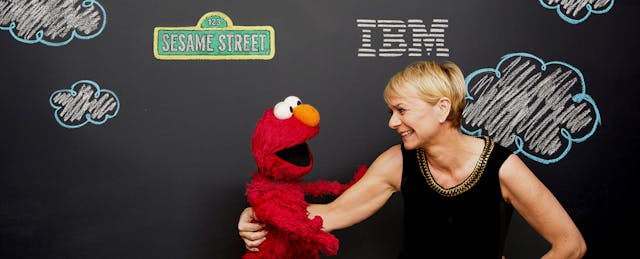In a not-too-distant future, Elmo may be able to respond to more than tickles. Imagine if the plush, cuddly doll can listen as kids read aloud and analyze their pronunciation and vocabulary. As Elmo learns, it can respond and suggest activities to help children build literacy skills.
Don’t get your hopes (or fears) too high yet; an intelligent and sentient Elmo isn’t coming to your home or classroom anytime soon, according to Sesame Workshop, the nonprofit behind Sesame Street. But it is actively exploring the technological feasibility of such scenarios, thanks to a three-year partnership with IBM announced today.
The creator of the popular children’s show is teaming up with the computing powerhouse to explore and develop tools that prepare toddlers to succeed in school. Research suggests that 90 percent of a child’s brain is developed the age of five, and it’s during these formative years that IBM and Sesame want to focus on.
The agreement involves “forming an interdisciplinary, cross-company team that will train [IBM] Watson to understand how kids learn,” Jeffrey Dunn, President and CEO of Sesame Workshop, tells EdSurge. With this knowledge, Dunn adds, Watson technology can be used to power products “that can engage and adapt to an individual child’s skills and abilities.” (One of the advisors on this collaborative effort is Todd Rose, Director of the Mind, Brain, and Education program at the Harvard Graduate School of Education and author of “The End of Average.”)
Executives from both organizations describe the collaboration as a marriage between Sesame’s cache of high-quality educational media and IBM Watson’s cognitive computing powers. “The Watson technology, coupled with Sesame content, offers the potential to help teachers and parents deliver personalized learning experiences,” says Stanley Litow, IBM’s Vice President of Corporate Citizenship and Corporate Affairs, and the former Deputy Chancellor at New York City Public Schools.
Ever since IBM Watson bested Ken Jennings and Brad Rutter on “Jeopardy!” in 2011, its creators have touted its potential to be more helpful to humans in areas such as healthcare and education. The company first suggested in 2014 that Watson might serve as a digital teacher’s assistant by 2016.
But don’t expect Watson to show up in classrooms in the form of a hulky Jeopardy podium anytime soon. The first phase of the Sesame-IBM partnership will involve high-octane brainstorming sessions involving educators, developers, scientists and researchers from both organizations to determine what tools to build and prototype. These could be a “smart” toy like Elmo, or a reading app for students that can adapt lessons and stories based on their interests. Satya Nitta, IBM’s Program Director of Cognitive Sciences and Education Technology, adds that his team is also “highly interested in tangible user interfaces [in the form of] physical blocks with digital signatures.”
From IBM’s perspective, Nitta says one of the main challenges is “to build intelligent tutoring systems that analyze natural language dialogue to help the computer understand what the human knows, and deliver much better learning experiences.” Literacy skills—a staple of Sesame’s educational programming since its founding—seems to be a good fit for this partnership. On “Jeopardy!” Watson showed off its ability to parse natural conversation—and all the puns, metaphors, double entendres and other figures of speech—to arrive (mostly) at correct answers.
Within the next year, at least one tool should be ready to be tested in schools. Nitta says as many as six different technologies could be developed by 2019. Each tool will be piloted in New York City schools and other classrooms around the country, and be fine-tuned based on feedback from teachers and students.
Putting a powerful machine in front of young children may raise concern among parents. But Dunn assures that both IBM and Sesame will comply with all laws and regulations around children’s privacy and security. “Sesame has been at the forefront of understanding and shaping privacy rules,” he states. “We want to use the data to deliver a great content experience, and not for something that is inappropriate with our mission.”
Sesame and IBM join a long list of companies that are attempting to build tools to analyze learners’ behaviors and assess their strengths and weaknesses to deliver personalized content. Among them is Knewton, a New York startup backed by more than $157 million in venture capital. But where most of the edtech industry is focused on serving schools, this partnership brings together two high-profile, mature organizations focused on helping the youngest of learners.
No money is changing hands between IBM and Sesame Workshop. “This is purely a research and development partnership,” Dunn tells EdSurge. He also recognizes that “we’re in the exploratory phase, and we’re ways away from arriving at a solution and implementation.”


